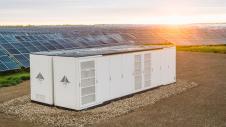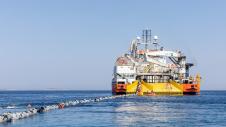A few days before Christmas in 2018, the Environment and Energy Minister, Giorgos Stathakis, proudly stated about the DESFA privatization agreement that had just been completed: "Finally, it is being done differently." He meant that SYRIZA's privatizations had no resemblance to the "colonial sell-off agreements of public property," which, according to SYRIZA, shut down the parties of the old bipartisanship.
Stathakis was right: the privatization agreement of a company with a strategic significance for our national economy, since it manages the natural gas grid network, was different, not only from other Greek privatizations, but perhaps different from most privatizations that take place internationally. It had a very high price, exceeding 500 million euros, and also allowed buyers to recover their money in a very short amount of time.
DESFA was transferred to the SENFLUGA Energy Infrastructure Holdings consortium, which includes Italian Snam, Spanish Enagas and Belgian Fluxys, while in early 2020, 10 percent of the consortium was acquired by the Kopelouzos group. The Syriza government, as stated by Stathakis, managed to "secure a clearly higher price", which amounted to the truly impressive amount of 535 million euros.
If one looks, however, at what the state is receiving in this exchange and how the price is being paid by buyers, one can see that this is a uniquely favorable agreement for the buyers:
- Most of the price was covered by a ten-year 350-million-euro bond loan from the National Bank, which had rushed to support this so called different privatization.
- Thus, two-thirds of the price was covered without requiring the new shareholders to put their hands in their pockets.
The SENFLUGA consortium then offered cash of just 185 million euros and acquired two-thirds of a company with 1.5 billion euros in assets and a net worth of 950 million euros by the end of 2018. Net profit for 2018 had risen to 73.45 million euros, while DESFA also had 217.9 million euros in its coffers.
Even this amount has been returned to the buyers, via two steps:
- On Tuesday, June 16, DESFA announced that shareholders approved at a general meeting the return of capital reaching 74.981 million euros. Thus, the consortium of buyers, as shareholders with 66 percent of the share capital, received from DESFA the amount of 50 million euros (49.49 million euros, to be exact).
- Earlier, with the end of the 2019 fiscal year, DESFA paid its shareholders a large dividend, totaling 186.818 million euros, of which 123.3 million euros went to the SENFLUGA consortium. It is worth noting that in the prior fiscal year the dividend that was distributed was 45.5 million euros, which means that the dividend was quadrupled in the first year the joint venture took on the company.
With the 50-million-euro return of capital and 123.3 million-euro dividend, within a year and a half the new shareholders have taken back 172.8 million euros, ie almost all of the cash (185 million euros) committed to the deal.
It is very difficult to find any other investment that would provide such a speedy and large return on money invested by shareholders. Ιt did, in fact, prove to be a 'different' privatization, which could only be achieved based with nationally proud negotiations, in which the Syriza government had specialized in.









